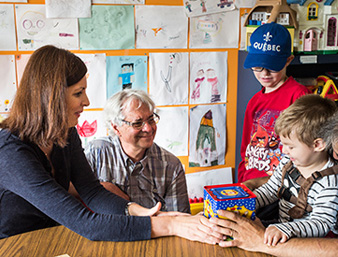

Volume:9, Issue: 3
Dec. 27, 2017


Dec. 27, 2017
To make the situation more concrete, we’d like to take you for a journey to our pediatric center. Let us look more closely at one particular story. Just as the cases we see daily in our community social pediatric settings, it clearly demonstrates the fact that behind what seems an ordinary problem or a disruptive behavior often lies a violation of children’s fundamental rights. It also highlights how to deal with different views from all actors involved in the child’s life and the importance of acting in the best interest of the child.
… An exasperated mother shouted in the clinic of community social pediatrics, “You’ve gotta give him a higher dose! He’s driving me crazy. If you don’t, they sure won’t let him back into school.” In the waiting room, a six-year-old boy stood as the “terror of the neighborhood” – and he knew it all right. He was considered so disruptive that the school had deprived him of his right to education several times. Earlier in his short existence, he’d been sent home from daycare and kindergarten on a regular basis. He was experiencing a form of rejection, not just by his age group and his school, but also by his family.
When he saw his social pediatrician, Louis ran up to him with a great big smile on his face. “He sure makes me sweat,” his mother said, visibly overwhelmed. “The school keeps sending him home.” The school principal and Louis’ teacher, who were present to participate in the evaluation of the boy’s difficulties, also said that they were overwhelmed. Their solution was that Louis should be given stronger and stronger medication for his own good and for the good of all other children. Since pills don’t cure every problem (certainly not a tender heart that’s hurting), the road to rejection was bound to continue. Little Louis would do everything he could to provoke rejection.
Around the table, information was shared. We were all able to understand that the problem was much more complex than his behavior. His father had been in jail since Louis was born. His mother lurched from depression to depression. She had to take in roomers to pay the rent; and even with this additional revenue, the fridge was sometimes empty. Louis learned very young to muddle through and compensate for the fact that his mother wasn’t there for him; she had several preoccupations. Little by little, he’d hardened himself and acquired the illusion of power to stop the pain he felt at being alone. If nothing were done, he would be sent to a school for kids with behavioral problems, far away from home, where his chances of becoming a dropout would soar as the years went by. Worst-case scenario: without appropriate support and with no prevention services available, the boy was at high risk of hanging out with delinquents and sinking into criminal behavior. At age 6, he’d already dabbled in shoplifting and bullying.
Given this information, what could be an appropriate solution (intervention) for Louis? We explored the only solution the school could come up with for the moment: to send him to another school with more rules and supervision. They also believed the youth protection department should be called in. Placing him in a center would help him learn to think about his behavior and acquire some self-discipline. Louis and his mother were already reacting – he would become even more oppositional.
We thus explored how each of the 7 principles of the CRC could assist us in finding a solution for Louis. With the help offered by the community social pediatrics center, it was decided with the boy that he would remain in his milieu: his mother would be accompanied by a social worker and would receive some help and respite in a non-judgmental approach; Louis would get individualized help with his homework with a volunteer, and he would get involved in after-school activities offered at the center that will help him control his anger. The solution did not include giving him a higher dose of medication, as it would only serve to mask the problem. Rather, follow-up meetings with the social pediatrician and the team were scheduled with the group to ensure that Louis’ situation improved through experiencing success. It turned out to be the only way to meet all this child’s needs while making sure he got the education he was entitled to receive.
1 Dr. Gilles Julien, C.M. (Recipient, Order of Canada, in recognition of his outstanding contributions at the local and regional level); O.Q. (Officer, National Order of Quebec); Social Pediatrician, Clinical Director, Founder and President of the Foundation Dr. Julien; Hélène (Sioui) Trudel, C.Q. (Chevalière, National Order of Quebec), Master of Law, General Director and Senior Legal Advisor, Foundation Dr. Julien.
Home | Copyright © 2026, Russian-American Education Forum